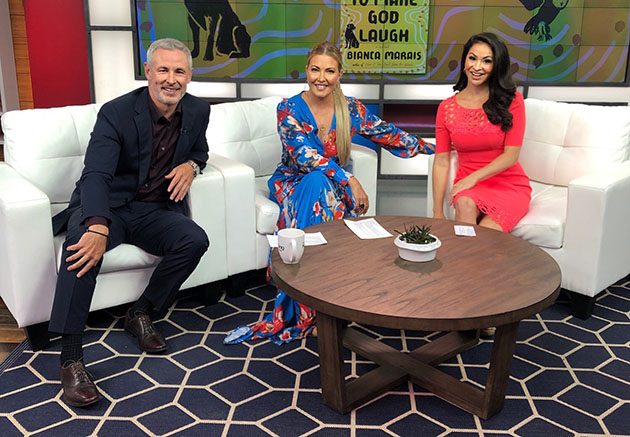July 15, 2019
What is The Marriage Pact?

Good morning! Earlier today, I joined Cheryl Hickey and Jeff McArthur on The Morning Show to talk about the Marriage Pact — an app designed to help students find a backup plan in case they don’t find a forever partner in time to align with their life goals.
Check out the summary and video below.
Important note: Of course, not everyone wants one forever partner, so check out last week’s podcast on Toxic Monogamy and our recent interview on Consensual Non-monogamy if you want to consider alternative approaches to relationships.
1. What is the marriage pact?
The Marriage Pact is a multi-year study out of Stanford designed to match people up in stable partnerships using economic theory and cutting-edge computer science. But it’s not designed to help you find the one — its goal is to help you find a backup plan. The program analyzes core values as opposed to interests and attraction (which can change) and since it was designed for college students, they opted not to focus on finding “the one” right away.
It started as a class project and went viral. They marketed it to their undergraduate classmates as a backup plan match and within an hour they had one thousand participants and ended up with 4100. Apparently the campus went berserk when they released the results with students frantically searching for their matches.
2. How is matching based on core values different than other sites that also claim to use algorithms to pair potential partners? And why do we need computer generated technology to help us find a match?
The creators draw from the paradox of choice theory: too many choices leads to paralysis by analysis. If you’re dating online, you tend to believe that your options are limitless and you raise your expectations to an unrealistic level. Unlike Tinder or OKCupid or eHarmony, the Marriage Pact is designed to help you find one person. You don’t have to marry them, but you might opt to do so in the future.
3. Is it normal or healthy to have a backup plan?
An estimated two-thirds of all college students who are in a committed relationship openly admit to having at least one backup partner in mind. (Reference: Dibble, J. L., Drouin, M., Aune, K. S., & Boller, R. R. (2015, June 11). Simmering on the back burner: communication with and disclosure of relationship alternatives. Communication Quarterly, 63(3), 329-344.)
This tendency can decline with age and those with dark personality traits (e.g. Machiavellianism, psychopathy, and narcissism) are more likely to report having a Plan-B. (Reference: Carter, G. L., Montanaro, Z., Linney, C., & Campbell, A. C. (2015). Women’s sexual competition and the Dark Triad. Personality and Individual Differences, 74, 245-279.)
Given that the dark triad can be associated with less stability and fulfillment in relationships, I’d suggest that having a backup plan (in a monogamous relationship) could be costly.
4. If you’re dating online, how can you look for someone with the same core values or find someone who would be a good match in a sea of profiles?
Similarity can create a match, but there is one factor that leads to happiness and fulfillment in the long term: kindness. Along with emotional stability, a rich body of research suggests that kindness is the key to lasting, happy relationships. A comprehensive study of 2500 couples over 20 years around that conscientiousness and emotional stability (low levels of neuroticism) are far stronger predictors of relationship satisfaction than likemindedness or having similar personalties.
The bottom line: Stop looking for compatibility. Instead, look for someone kind and emotionally stable. You can create passion, chemistry and compatibility, but you’ll want to create it with someone who will be good to you in two, ten, twenty and fifty years.
Additional note: Apps like the Marriage Pact that match students with their peers at Ivy League schools further reinforce income inequality as the achievement gap between kids of rich and poor couples continue to grow. Read more about this here and here.










